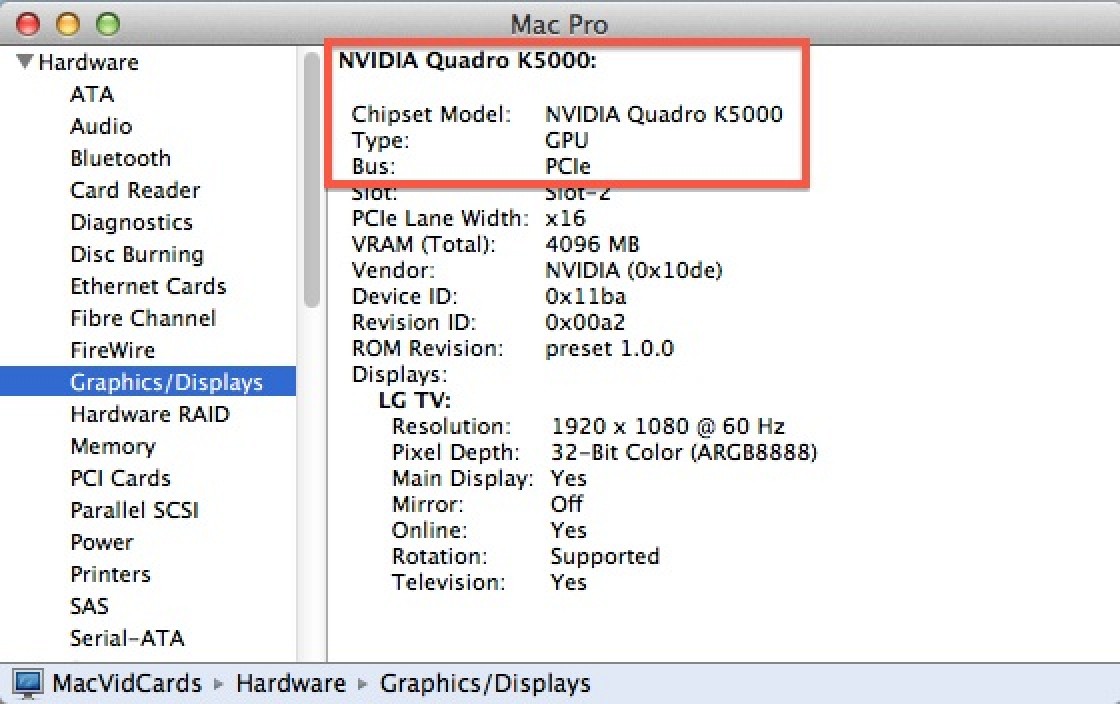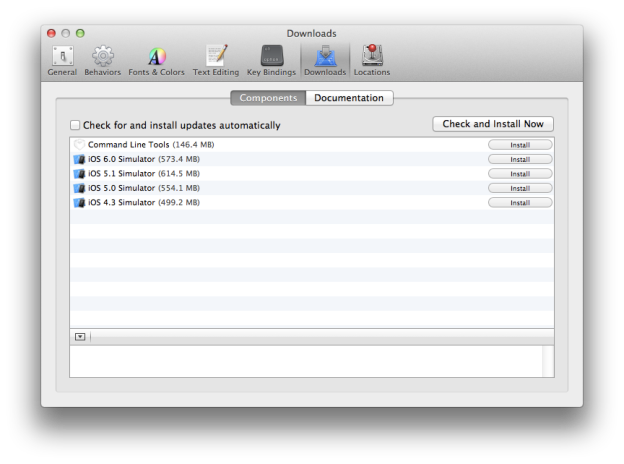-
Bfg Graphics Drivers For Mac카테고리 없음 2020. 2. 18. 21:49
Please be aware that while the 3,1 Mac Pro has the same GPU compatibility as the 4,1 or 5,1 that the older hardware of the 3,1 will result in some comparative bottlenecking. In general I recommend the GTX 770 as the high end for the 3,1 Mac Pro as it maintains its price/performance ratio. NVIDIA vetted driver developed for graphics cards compatible with Mac Pro computers Even if you can employ the default OS X Graphics Driver, installing the Nvidia Quadro & GeForce Driver is recommended if you want to take full advantage of all the cards capabilities.
Bfg Graphics Drivers For Mac Free
Vulkan Initial release February 16, 2016; 2 years ago ( 2016-02-16) 1.1.94 (November 26, 2018; 3 days ago ( 2018-11-26) ) Written in, 3D graphics and compute Website Vulkan is a low-,. Vulkan targets high-performance realtime 3D graphics applications such as and across all platforms. Compared with and, and like and, Vulkan is intended to offer higher performance and more balanced / usage. Other major differences from Direct3D 11 (and prior) and OpenGL are Vulkan being a considerably lower level API and offering parallel tasking. Vulkan also has the ability to render 2D graphics applications; however, it is generally best suited for 3D. In addition to its lower CPU usage, Vulkan is also able to better distribute work among. In general, Vulkan is said to induce anywhere from a marginal to polynomial speedup in runtime relative to other APIs if implemented properly on the same hardware.
Vulkan was first announced by the non-profit at 2015. The Vulkan API was initially referred to as the 'next generation initiative', or 'OpenGL next' by Khronos, but use of those names was discontinued once the Vulkan name was announced. Vulkan is derived from and built upon components of 's API, which was donated by AMD to Khronos with the intent of giving Khronos a foundation on which to begin developing a low-level API that they could standardize across the industry, much like OpenGL. OpenGL and Vulkan are both rendering APIs, in both cases the GPU executes while the CPU executes everything else.

Vulkan is intended to provide a variety of advantages over other APIs as well as its predecessor,. Vulkan offers lower overhead, more direct control over the GPU, and lower CPU usage. The overall concept and feature set of Vulkan is similar to Direct3D 12, Metal and Mantle.
Intended advantages of Vulkan over previous-generation APIs include:. Vulkan API is well suited for high-end graphics cards as well as for graphics hardware on mobile devices (OpenGL has a specific subset for mobile devices called; it's still an alternative API in Vulkan supporting devices). In contrast to Direct3D 12, Vulkan is available on multiple modern operating systems; like OpenGL, the Vulkan API is not locked to a single OS or device form factor.
As of release, Vulkan runs on, and (freely licensed third-party support for and is also available). Reduced driver overhead, reducing CPU workloads. Reduced load on CPUs through the use of batchingleaving the CPU free to do more computation or rendering than otherwise. Better scaling on multi-core CPUs. Direct3D 11 and OpenGL 4 were initially designed for use with single-core CPUs and only received augmentation to be executed on multi-cores.

Even when application developers use the augmentations, the API regularly does not scale well on multi-cores. OpenGL uses the high-level language for writing which forces each OpenGL driver to implement its own for GLSL that executes at application runtime to translate the program's shaders into the GPU's machine code. Instead, Vulkan drivers are supposed to ingest shaders already translated into an intermediate binary format called (Standard Portable Intermediate Representation), analogous to the binary format that shaders are compiled into in. By allowing shader pre-compilation, application initialization speed is improved and a larger variety of shaders can be used per scene. A Vulkan driver only needs to do GPU specific optimization and code generation, resulting in easier driver maintenance, and eventually smaller driver packages (currently GPU vendors still have to include OpenGL/CL). Unified management of and graphical, eliminating the need to use a separate compute API in conjunction with a graphics API.
This section may require for grammar, style, cohesion, tone, or spelling. You can assist. (November 2018) On March 26, 2018, Khronos Group and announced project V-EZ; Short for 'Easy Mode' for Vulkan,the goal of V-EZ is to reduce the complexity of the IDE syntax within the Vulkan API by implementing an additional library within the base SDK. In August 2018 moves library to open source. GLOVE: OpenGL ES over Vulkan Another middleware that allows legacy applications to run on top of Vulkan was open-sourced by in August 2018.

This software allows thinner Vulkan drivers to be used in system instead of multiple OpenGL ES and Vulkan drivers. In addition with MoltenVK, GLOVE allows to use OpenGL ES on macOS/iOS devices. Vulkan 1.1 On March 7, 2018, Vulkan 1.1 was released by the Khronos Group. This first major update to the API standardized several extensions, such as multi-view, device groups, cross-process and cross-API sharing, advanced compute functionality, HLSL support, and YCbCr support. At the same time it also brings better compatibility with DirectX 12, explicit multi-GPU support and lays the groundwork for next generation of GPUs.
Added support for graphics cards. Alongside Vulkan 1.1, SPIR-V also got updated to version 1.3. Versions Version Date 1.0.93 18 November 2018 1.1.93 18 November 2018 Software that supports Vulkan Video games Title Original release date Vulkan support since Notes Aerofly FS 2 November 20, 2017 June 6, 2018 IPACS IPACS Microsoft Windows Support added in an update June 22, 1996 July 20, 2016, Support added via vkQuake port. Support for Windows added in vkQuake 0.20 on July 30, 2016 December 2, 1999 May 30, 2017, Support added in Kenny Edition project.
2006 March 15, 2017 Roblox Corporation Roblox Corporation, Support added in an update July 9, 2013 May 23, 2016, Support added in an update; macOS support added in 2018 June 24, 2014 TBA, A Vulkan-only Android version of the game has been announced. September 11, 2014 February 17, 2016, The first game with Vulkan rendering support. Support added in an update.
November 16, 2014 August 20, 2016 Score! Hero August 6, 2015 September 16, 2016 First Touch Games First Touch Games September 30, 2015 August 20, 2016 Heroes of Incredible Tales November 18, 2015 August 20, 2016 NAT Games February 26, 2016 October 14, 2016 First Touch Games First Touch Games March 31, 2016 August 31, 2017, Support added in an update Olympus Rising May 3, 2016 August 20, 2016 Flaregames Flaregames October 2012 August 12, 2017 Support added via vkDOOM3 port.